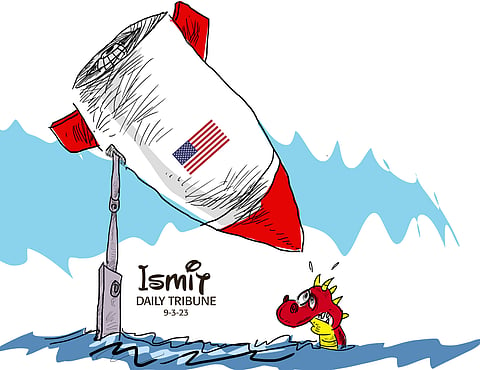
- NEWS
- the EDIT
- COMMENTARY
- BUSINESS
- LIFE
- SHOW
- ACTION
- GLOBAL GOALS
- SNAPS
- DYARYO TIRADA
- MORE

Beijing always ups the ante when it senses that its rival for the region's security, the United States, is making its move to challenge its dominance in the region, which was probably how the 10-dash line came to be.
With the release of the new map showing an expanded "historical" claim that included parts of India, China issued a strong criticism of the Americans with Senior Col. Wu Qian, spokesperson for China's Ministry of National Defense, saying the US should "stop meddling in the South China Sea issue, stop sowing discord and fanning the flames, and stop disrupting regional peace and stability."
The comment was in response to US Secretary of Defense Lloyd Austin III's statement that "the 2016 Arbitral Tribunal ruling is binding on all parties" and "the Mutual Defense Treaty extends to Philippine public vessels, aircraft and armed forces — to include those of its Coast Guard — in the Pacific, including in the South China Sea."
Vice Admiral Karl Thomas, commander of the US Navy's Seventh Fleet, backed the American position, saying the recent use of a water cannon by China's Coast Guard against a Philippine vessel "must be challenged and checked." He also "assured the Philippines of US backing."
Wu reiterated China's position that the Philippines infringed on its sovereignty and violated the Declaration on the Conduct of Parties in the South China Sea to justify the China Coast Guard's action.
"We hope regional countries can stay vigilant, faithfully implement the DoC, and work with the Chinese side to maintain peace and stability in the region. The Chinese military will resolutely safeguard China's national sovereignty and maritime rights and interests, as well as peace and stability in the South China Sea," the spokesperson stressed.
The increasing challenge from China should be matched by the US, according to geopolitical experts.
A former Pentagon official, Michael Rubin, suggested the "reflagging" of islands in the disputed areas to send a clear message to China.
Rubin recalled an incident in 1987 when President Ronald Reagan ordered the reflagging of nearly a dozen Kuwaiti tankers to stop Iran from attacking them to force the emirate to cease its trade with and loans to Iraq.
"Reagan ignored criticism that reflagging the tankers could embroil the United States in war because he understood that at stake were not only Kuwait's oil exports but also freedom of navigation and the rules-based order," Rubin explained.
He said that while skirmishes did occur, "once the ayatollahs understood Reagan stood firm, Iranian forces suspended their provocations."
Rubin believes that since China challenges the freedom of navigation and the broader liberal order, "perhaps the US could take a page from Reagan's playbook and reflag not ships but rather some of the rocks, reefs, and atolls over which China now erroneously claims sovereignty."
The Permanent Court of Arbitration in The Hague invalidated in 2016 the historical claim of China through its nine-dash line as being without basis. The root of the claim was a 1947 map the authenticity of which historians dismissed.
"That Beijing bases its claim on supposed historic Chinese fishing activity further displays the emptiness of the Chinese Communist Party's logic. After all, Vietnamese, Taiwanese, Malay, Filipino and Indonesian fishermen also plied the same waters and perhaps even some closer to China," Rubin noted.
"Regardless, using the fictional map, China, in one fell swoop, claimed the bulk of the South China Sea and its considerable fishing and oil reserves," he said.
His proposal would be based on "leases drawn between the US government and its regional partners."
The leases would be backed by the arbitral award.
"While the current US legal position supports the 2016 Hague tribunal judgment that finds no power can legally exercise sovereignty over disputed territories, the White House might reconsider this (stance)," Rubin added.
But Rubin admitted that a greater problem might be the unwillingness of the regional states to offer leases.
The proposal breaks with the usual conventions in the settling of disputes.
Americans have a term for that, however: "It's so crazy, it just might work."
